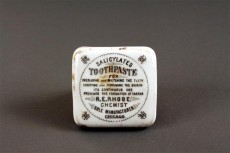$800,000 grant to support digital innovation project
 This toothpaste tin is one of many architectural details and artifacts found on the grounds of the Charnley-Persky home.
This toothpaste tin is one of many architectural details and artifacts found on the grounds of the Charnley-Persky home.
Lake Forest College is pleased to announce a new $800,000, four-year grant from The Andrew W. Mellon Foundation to involve students and faculty in urban archeological digs in Chicago, and in complementary coursework in various disciplines.
The grant is designed to produce digital applications for the public to use in learning about the building sites and Chicago culture from the relevant time periods.
“This project is both physical and digital,” said program director and Associate Dean of the Faculty Davis Schneiderman. “We are unearthing the past from the ground as urban archaeologists; studying it as historians, musicians, literary critics, and more; and transforming the results for the readers, viewers, and users of the future.”
Inspired by current and potential excavations at key architectural sites in Chicago, the initiative will reveal the cultural context of one or more such sites by developing and exposing connections among literature, art, social and political events. The project will employ digital humanities tools in the documentation and preservation of project materials and research, and will produce digital products and educational materials for use in extensive public educational outreach. These digital products will include mobile interactive platforms and comprehensive web archives of the cultural materials, which will be maintained by the College and one or more of our institutional partners after the end of the project.
Administered by the Lake Forest College Center for Chicago Programs, the first project will be a summer Archeological Field School at the Charnley-Persky House in Chicago, where the grounds of the National Historic Landmark designed by Louis Sullivan and Frank Lloyd Wright still contain many artifacts, site elements, and history waiting to be unearthed.
Urban archaeologist and Assistant Professor of Sociology and Anthropology Rebecca Graff will lead a series of archeological excavations at the house, which is located at 1365 N. Astor Street in Chicago’s Gold Coast neighborhood. The structure is home to the Society of Architectural Historians (SAH), one of several project partners.
“Urban archaeology allows us to bring the past to light in ways that inform our present understandings of our great American cities,” said Graff. “Chicago deserves to have its stories told before we lose them to construction and development. This initiative will help connect people to the history right under their feet, informing the daily lives of Chicagoans past, present, and future.”
Pauline Saliga, Executive Director, Society of Architectural Historians, sees similar opportunities: “We look forward to working with Professor Graff and her students to unearth new household artifacts and to use them to interpret life in 19th century Chicago. As a learned society, SAH recognizes the importance of such cooperative ventures that are rooted in serious research and are opportunities to mentor undergraduates in the art of critical thinking.”
In addition to the SAH, Lake Forest anticipates collaborating with several Chicago-area partners including the Chaddick Institute for Metropolitan Studies at DePaul University, and the Chicago Park District, among others.
“We could not do this valuable work without the support of the Mellon Foundation, and we expect to bring this work to thousands of students, faculty, participants, collaborators, and the general public in a way that has a sustained impact on Chicago and the humanities,” Schneiderman said.
News Contact
Davis SchneidermanDirector, Center for Chicago Programs
dschneid@lakeforest.edu
847-735-5282